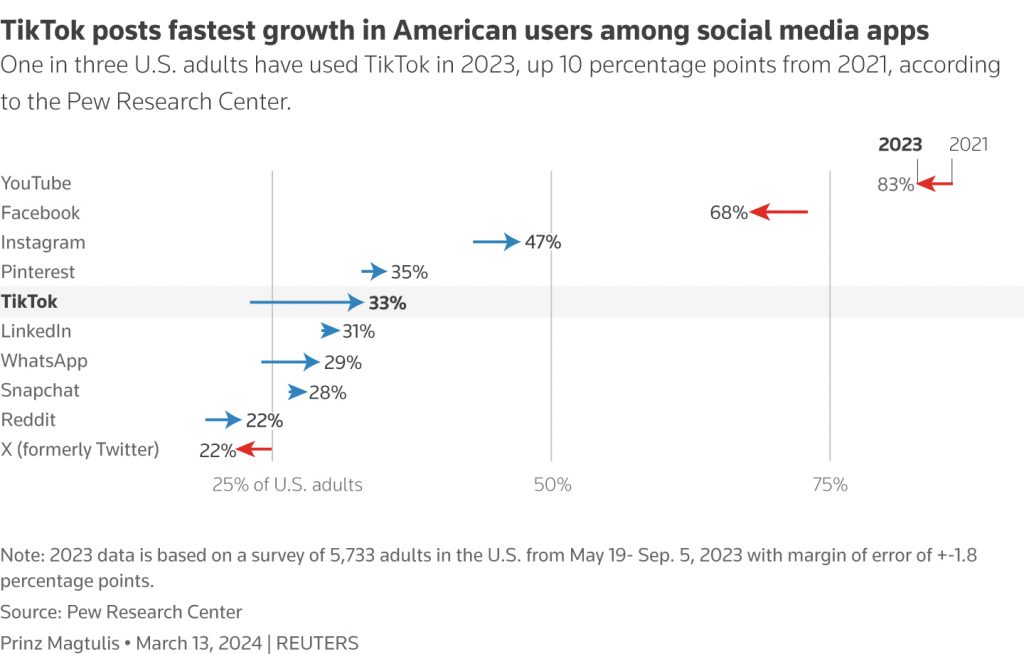China’s foreign ministry has described a new US law that proposes forced divestment of TikTok in the United States as an “act of bullying.”
Speaking at a news conference in Beijing before US lawmakers voted on the bill, foreign ministry spokesman Wang Wenbin said: “Even though the US has not found evidence on how TikTok endangers its national security, it has never stopped going after TikTok.”
Wang said the US resorts “to acts of bullying” when it fails to succeed in fair competition and that disrupted markets, undermined investor confidence and the global economic order. “This will eventually backfire on the US itself,” he said.
ALSO SEE: Tesla Eyes Southeast Asia’s EV Boom But Faces China Challenge
The bill received overwhelming bipartisan support when it was put to a vote in the US House of Representatives on Wednesday, passing by 352 to 65.
The proposed law, which now goes to the Senate, would give TikTok’s Chinese owner ByteDance about six months to divest the US assets of the short-video app – or face a ban.
US accused of ‘gangster thinking’
China’s reaction on Thursday, after the bill was passed, was even stronger, with the Global Times quoting officials who claimed the move “laid bare Washington’s ‘gangster thinking’ .. robbing those who seem to prosper.”
The state-owned outlet claimed the bill had “drawn strong pushback from the international society” (sic), and TikTok’s 170 million American users.
Chinese officials said they would take all necessary measures to safeguard the company’s legitimate rights, it reported.
The foreign ministry’s Wang said on Thursday: “The way the US is handling the TikTok case has made the world see clearly whether the US’s rules-based order is indeed globally beneficial, or whether it is exclusively serving the US’s own interests.”
There was no fairness or justice if the US used so-called a “national security” excuse to arbitrarily suppress excellent enterprises of other countries, he said at today’s media conference.
Uncertainty on Senate reaction
But what happens next is uncertain. The bill could be amended or take an alternate path in the 100-member Upper House, where some senators favour a different approach to regulating foreign-owned apps that could pose security concerns.
Democratic Senate Majority Leader Chuck Schumer has not indicated how he plans to proceed.
But if the Senate does decide to push for divestment, TikTok’s parent Bytedance would have to decide whether to sell all of the app or just its US business, the New York Times said in its morning note, adding that it might be tough to find a buyer as the price could be tens of billions of dollars.
TikTok’s fate has become a major issue in Washington. Democratic and Republican lawmakers said their offices had received large volumes of calls from teenaged TikTok users who oppose the legislation, with the volume of complaints at times exceeding the number of calls seeking a ceasefire between Israel and Hamas in Gaza.
The measure is the latest in a series of moves in Washington to respond to US national security concerns about China, from connected vehicles to advanced artificial-intelligence chips to cranes at US ports.
“This is a critical national security issue. The Senate must take this up and pass it,” No-2 House Republican Steve Scalise said on social media platform X.
Shortly after passage, a bipartisan pair of senators, Democrat Mark Warner and Republican Marco Rubio, issued a joint statement saying they were encouraged by the bipartisan support for the bill and that they “look forward to working together to get this bill passed through the Senate and signed into law.”
The vote comes just over a week since the bill was proposed following one public hearing with little debate, and after action in Congress had stalled for more than a year. Last month, President Joe Biden’s re-election campaign joined TikTok, raising hopes among TikTok officials that legislation was unlikely this year.
The House Energy and Commerce Committee last week voted 50-0 in favor of the bill, setting it up for a vote before the full House.
White House: Goal is new owner, not a ban
TikTok CEO Shou Zi Chew will visit Capitol Hill on Wednesday on a previously scheduled trip to talk to senators, a source briefed on the matter said.
“This legislation has a predetermined outcome: a total ban of TikTok in the United States,” the company said before the vote. “The government is attempting to strip 170 million Americans of their Constitutional right to free expression,” it added.
Biden said last week that he would sign the bill.
White House national security adviser Jake Sullivan said on Tuesday the goal was ending Chinese ownership, not banning TikTok.
“Do we want TikTok, as a platform, to be owned by an American company or owned by China? Do we want the data from TikTok – children’s data, adults’ data – to be going, to be staying here in America or going to China?” he said.
It is unclear whether China would approve any sale or if TikTok’s US assets could be divested in six months.
If ByteDance failed to do so, app stores operated by Apple, Alphabet’s Google and others could not legally offer TikTok or provide web hosting services to ByteDance-controlled applications.
In 2020, then-President Donald Trump sought to ban TikTok and Chinese-owned WeChat but was blocked by the courts. In recent days he had raised concerns about a ban. It remains unclear if Tencent’s WeChat or other high-profile Chinese-owned apps could face a ban under the legislation.
Any forced TikTok divestment from the US would almost certainly face legal challenges, which the company would need to file within 165 days of the bill being signed by the President. In November, a US judge blocked a Montana state ban on TikTok use after the company sued.
- Jim Pollard with Reuters
NOTE: Further detail (on China’s reaction to the House vote and NYT comment) was added to this report on March 14, 2024.
ALSO SEE:
TikTok Ban Would Help ‘Enemy of the People’ Facebook: Trump
‘If They Pass It, I’ll Sign It’: Biden Backs Bill to Ban TikTok
TikTok, US Lawmakers in War of Words as Bill to Ban App Gets Fuel
Suspicion And Mistrust Continuing to Shadow TikTok
TikTok Hit With $370m EU Fine Over Children’s Data Breaches
TikTok to Spend Billions in Southeast Asia, Focus on E-Commerce
US and Canada Order TikTok Cut From All Government Phones
China’s TikTok Sues Montana Over Statewide Ban
TikTok CEO to Tell US Lawmakers: ‘We’ve Never Shared Data’

























